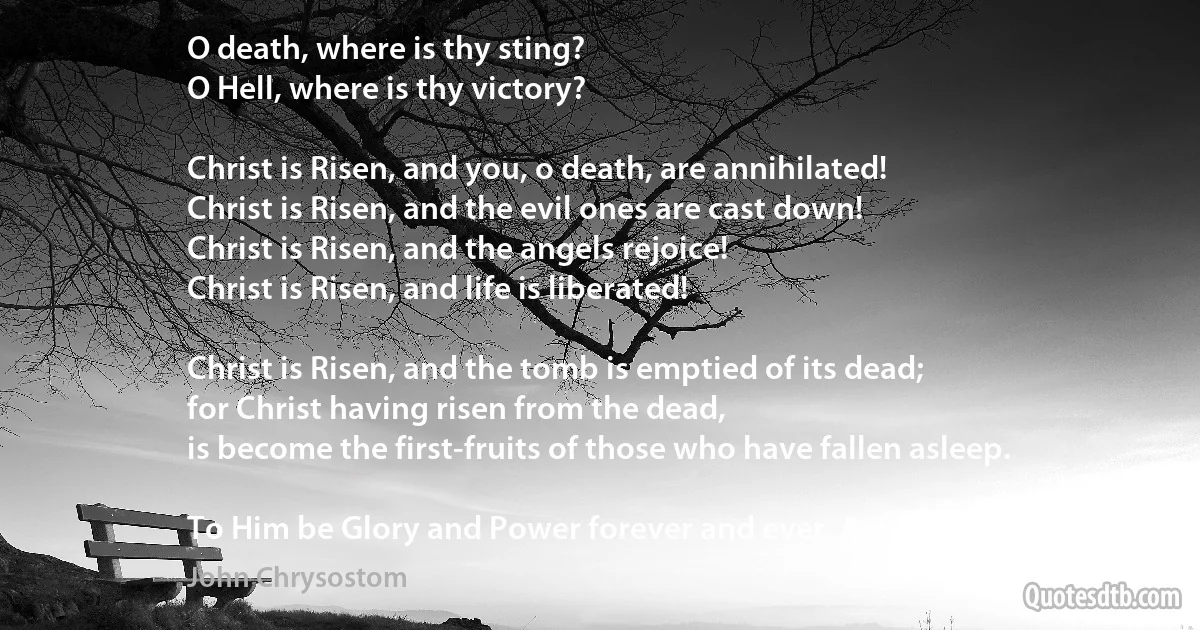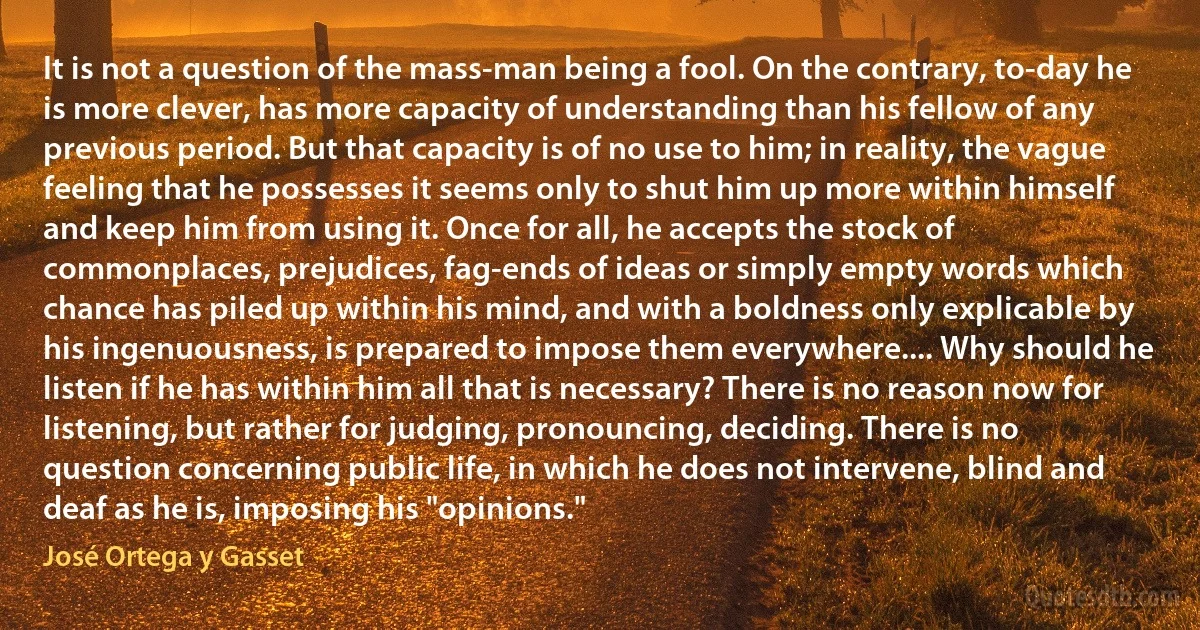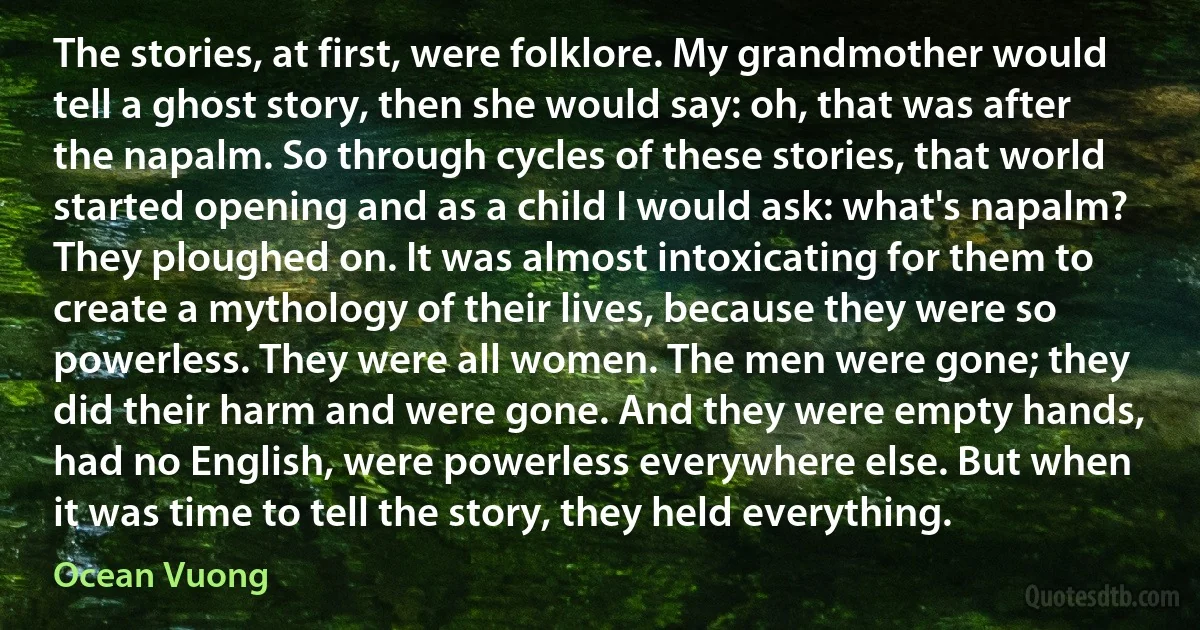Empty Quotes - page 50
The man who has struggled bravely with the passions of the body, has fought ably against unclean spirits, and has expelled from his soul the conceptual images they provoke, should pray for a pure heart to be given him and for a spirit of integrity to be renewed within him (cf. Ps. 51:10). In other words, he should pray that by grace he may be completely emptied of evil thoughts and filled with divine thoughts, so that he may become a spiritual world of God, splendid and vast, wrought from moral, natural and theological forms of contemplation.

Maximus the Confessor
True spiritual knowledge has sometimes flourished most grandly in some who were without eloquence and almost illiterate. And this is very clearly shown by the case of the Apostles and many holy men, who did not spread themselves out with an empty show of leaves, but were bowed down by the weight of the true fruits of spiritual knowledge: of whom it is written in Acts: 'But when they saw the boldness of Peter and John, and perceived that they were ignorant and unlearned men, they were astonished' (Acts 4:13).

John Cassian
It doesn't take many people to muck up a roadside. A devoted handful can do the trick. One of the things I find repeatedly is a plastic Diet Coke bottle containing a meticulously folded Mars bar wrapper. I imagine this is someone's after-work snack and that by putting the wrapper inside the empty bottle, the person feels he's done his bit. And though he has turned two pieces of trash into one, until he learns to keep it in his car, I don't think he's entitled to pat himself on the back.

David Sedaris
Part of a team,” Ann said dully.
"Well, you are.”
"I know.” She sighed. "We'll all say that. We'll all go on and make the place safe. Roads, cities. New sky, new soil. Until it's all some kind of Siberia or Northwest Territories, and Mars will be gone and we'll be here, and we'll wonder why we feel so empty. Why when we look at the land we can never see anything but our own faces.

Kim Stanley Robinson
You [=Caligula], O most wretched of men! having filled every continent and every island with good laws, and principles of justice, and wealth, and comfort, and prosperity, and abundance of other blessings, you, wretched man, full of all cowardice and iniquity, who have emptied every city of all the things which can conduce to stability and prosperity, and have made them full of everything which leads to trouble and confusion, and the most utter misery and desolation.

Caligula
Masonically we are heirs of past. Our Masonic ancestors gave the craft devotion, loyalty and faith and made it an illustrious institution in the world. It should be our religious duty to appreciate and conserve the rich inheritance. In view of the increasing complexity of life and the maintenance of the best and highest traditions of the Craft, great care and concern should be displayed, if Freemasonry has to function in the best interests of humanity. It has been truly said, that an inspired and inspiring dedication to service should be the part of every Mason's life. Let us not give in to skepticism. There is all the difference between a pessimist and an optimist, in any field of human endeavour. One looks at his glass and cries "My glass is half empty”. The optimist looks and exclaims "My glass is half full”.

Jayachamarajendra Wadiyar
The sexual revolution has begun to devour its children. The statistics on abortion, divorce, collapsing birthrates, single-parent homes, teen suicides, school shootings, drug use, child abuse, spouse abuse, violent crime, incarceration rates, promiscuity, and falling test scores show how this society, in which the cultural revolution is ascendant, is decomposing and dying. Empty nurseries and full waiting rooms outside the psychiatrist's office testify that all is not well. But before this diseased culture runs its course, it may take the West down with it.

Pat Buchanan
Facts are verified information that is then presented as objective reality. The rub here is the verified part. How do you verify verified? Facts are slippery, and so is verification. Today's verification may not be tomorrow's. It turns out that facts may not really be facts; they can change as the verification changes; they may only tell part of the story, not the whole story; or they may be so qualified by verifiers that they're empty of information.

Colin Powell
Above all our thought should be empty, waiting, not seeking anything, but ready to receive in its naked truth the object that is to penetrate it.
All wrong translations, all absurdities in geometry problems, all clumsiness of style, and all faulty connection of ideas in compositions and essays, all such things are due to the fact that thought has seized upon some idea too hastily, and being thus prematurely blocked, is not open to the truth.

Simone Weil
We succeeded in finding a place shallow enough to haul our empty wagons across: but for this good fortune we should have been under the necessity of taking them to pieces (as I had before done), and of ferrying them on the 'small craft' before mentioned. Half of a wagon may thus be crossed at a time, by carefully balancing it upon the canoe, yet there is of course no little danger of capsizing during the passage.

Josiah Gregg
It seems impossible to believe that Life, so rare a fruit of the universe, intelligent Life, conscious Life, to which the long course of evolution has been so manifestly leading up all through the long ages, should have no better destiny than a final and hopeless extinction; that this Earth and all the efforts and aspirations of the long generations of men should have no worthier end than to swing, throughout the eternal ages, an empty, frozen heap of dust, circling round the extinct cinder that was once its Sun. If we look backward, we seem to discern clear signs of progress; if we look forward, we discern nothing but the veil. Science is but organized experience, and experience of the future we have none.

Edward Walter Maunder
For centuries we have been spoon-fed by our teachers, by our authorities, by our books, our saints. We say, "Tell me all about it - what lies beyond the hills and the mountains and the earth?" and we are satisfied with their descriptions, which means that we live on words and our life is shallow and empty. We are secondhand people. We have lived on what we have been told, either guided by our inclinations, our tendencies, or compelled to accept by circumstances and environment. We are the result of all kinds of influences and there is nothing new in us, nothing that we have discovered for ourselves; nothing original, pristine, clear.

Jiddu Krishnamurti
So you must ask this question, put this question to yourself, whether your mind can be empty of all its past and yet retain the technological knowledge, your engineering knowledge, your linguistic knowledge, the memory of all that, and yet function from a mind that is completely empty. The emptying of that mind comes about naturally, sweetly without bidding, when you understand yourself, when you understand what you are. What you are is the memory, bundle of memories, experiences, thoughts. When you understand that, look at it, observe it; and when you observe it, see in that observation that there is no duality between the observer and the observed; then when you see that, you will see that your mind can be completely empty, attentive, and in that attention you can act wholly, without any fragmentation.

Jiddu Krishnamurti
When I left, Merle was wearing a bungalow apron and rolling pie-crust. She came to the door wiping her hands on the apron and kissed me on the mouth and began to cry and ran back into the house, leaving the doorway empty until her mother came into the space with a broad homely smile on her face to watch me drive away.
I had a funny feeling as I saw the house disappear, as though I had written a poem and it was very good and I had lost it and would never remember it again.

Raymond Chandler
Dreamer of dreams, born out of my due time,
Why should I strive to set the crooked straight?
Let it suffice me that my murmuring rhyme
Beats with light wing against the ivory gate,
Telling a tale not too importunate
To those who in the sleepy region stay,
Lulled by the singer of an empty day.

William Morris
A group of fisherwomen on their way home from a distant market held on an afternoon, were overtaken by a heavy hailstorm at nightfall in the middle of their way, and so were compelled to take shelter in a florist's house near at hand. Through the kindness of the florist they were allowed to sleep that night in one of his rooms, where some baskets of sweet-smelling flowers had been kept for supplying his customers. The atmosphere of the room was too good for the fisherwomen, and they could not, owing to it, get even a wink of sleep, till one of them suggested a remedy by saying, Let each of us keep her empty basket of fish close to her nose, and thus prevent this troublesome smell of flowers from attacking our nostrils and killing our sleep.' Every one gladly agreed to the proposal, and did accordingly ; and soon all began to snore. Such, indeed, is the power and influence of bad habits over all those who are addicted to them.

Ramakrishna
When I lost my mother, I thought, there's no point. Everything I have done, I'd done for her. I went to school for her. She gave me no pressure. You know, and it's important for me to say this because, you know, there's a stereotype of the Asian tiger mom. My mother was never such a mother. She said, whatever you want to do, as long as you're happy, you can do it. And worse comes to worst, she points to the desk. She works in a nail salon. She points to the desk beside her. There's always an empty desk in the salon. She says, you can sit down right here, and then we'll work together. So I had ultimate freedom to explore. And I think for me, you know, that freedom really was all to serve her. It was, how do I help my mother get out of the projects? Every immigrant has that dream.

Ocean Vuong
A couple, a man and a woman - poor human beings almost always go in pairs - approached, and passed. I saw the empty space between them. In life's tragedy, separation is the only thing one sees. They had been happy, and they were no longer happy. They were almost old already. He did not care for her, although they were growing old together. What were they saying? In a moment of open-heartedness, trusting to the peacefulness reigning between them at that time, he owned up to an old transgression, to a betrayal scrupulously and religiously hidden until then. Alas, his words brought back an irreparable agony. The past, which had gently lain dead, rose to life again for suffering. Their former happiness was destroyed. The days gone by, which they had believed happy, were made sad; and that is the woe in everything.

Henri Barbusse
I would count him blessed and holy to whom such rapture has been vouchsafed in this mortal life, for even an instant to lose thyself,
as if thou wert emptied and lost and swallowed up in God, is no human love; it is celestial.
But if sometimes a poor mortal feels that heavenly joy for a rapturous moment, then this wretched life envies his happiness,
the malice of daily trifles disturbs him, this body of death weighs him down, the needs of the flesh are imperative,
the weakness of corruption fails him, and above all brotherly love calls him back to duty.
Alas! that voice summons him to re-enter his own round of existence; and he must ever cry out lamentably,
‘O Lord, I am oppressed: undertake for me' (Isa. 38.14); and again, ‘O wretched man that I am! who shall deliver me from the body of this death?' (Rom. 7.24)

Bernard of Clairvaux



